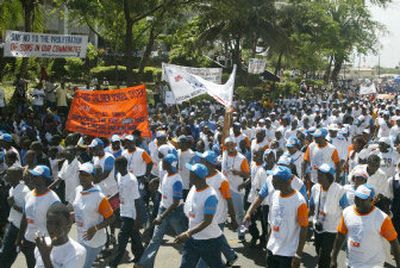March against hunger

MONROVIA, Liberia – Tens of thousands of children marched against hunger in Liberia on Sunday, adding their voices to a global event to tackle food shortages that many in the war-battered west African nation have felt firsthand.
“When you are hungry you can’t listen to teachers,” said 14-year-old Musu Smith. “It was hunger that killed plenty people in Liberia during the war.”
“We were forced to eat all types of leaves and fruits just to survive when we were running from fighters,” said Ma Korto Nyalay, a roadside vendor in Monrovia who lost her home in the ten-year civil war.
Fighting devastated Liberia’s agriculture sector, leaving the country largely dependent on imports and food aid. Vice President Joseph Boakai said recently that Liberia imports about 70 percent of its food, compared to 30 percent before the war.
“Large numbers of Liberians can hardly meet most of their basic needs such as food, shelter and other means to keep their families healthy,” said Abidirahman Meygag, deputy director of the World Food Program’s Liberia program. The U.N. agency organized the march, which occurred in more than 110 countries.
In Monrovia, streets were blocked off and more than 30,000 people wearing “Fight Hunger” T-shirts walked and sang alongside a marching band.
Many of the children said they were eager to glimpse Nigerian movie star Omotola Jalade Ekeinde, who was participating in the walk. President Ellen Johnson Sirleaf also marched.
About 80,000 children had signed up to march throughout 15 counties in Liberia, accompanied by their parents, organizers said.
This year continues to be precarious for Liberia’s food security. The World Food Program said it is short by about $9.7 million for the next six months, making it difficult to keep to a target of getting food aid to 700,000 people a month.
Monrovia resident James Lamine said countries with food crises need more than just food aid. “We need practical actions that will help us feed ourselves,” Lamine said.
Around the world, 416 marches were planned in 117 countries, with the first one in Auckland, New Zealand, and the last in Samoa. Arlene Mitchell, director of the Walk the World program in Rome, said organizers hoped to raise $5 million.
In Kenya, marathon star Paul Tergat was among more than 1,000 people who turned out for a march there, saying he benefited from school meal programs when he was a child.
“We are here to raise funds to support a school feeding program, which enables kids that can’t afford meals at schools,” said Tergat, who won the New York City marathon in November.